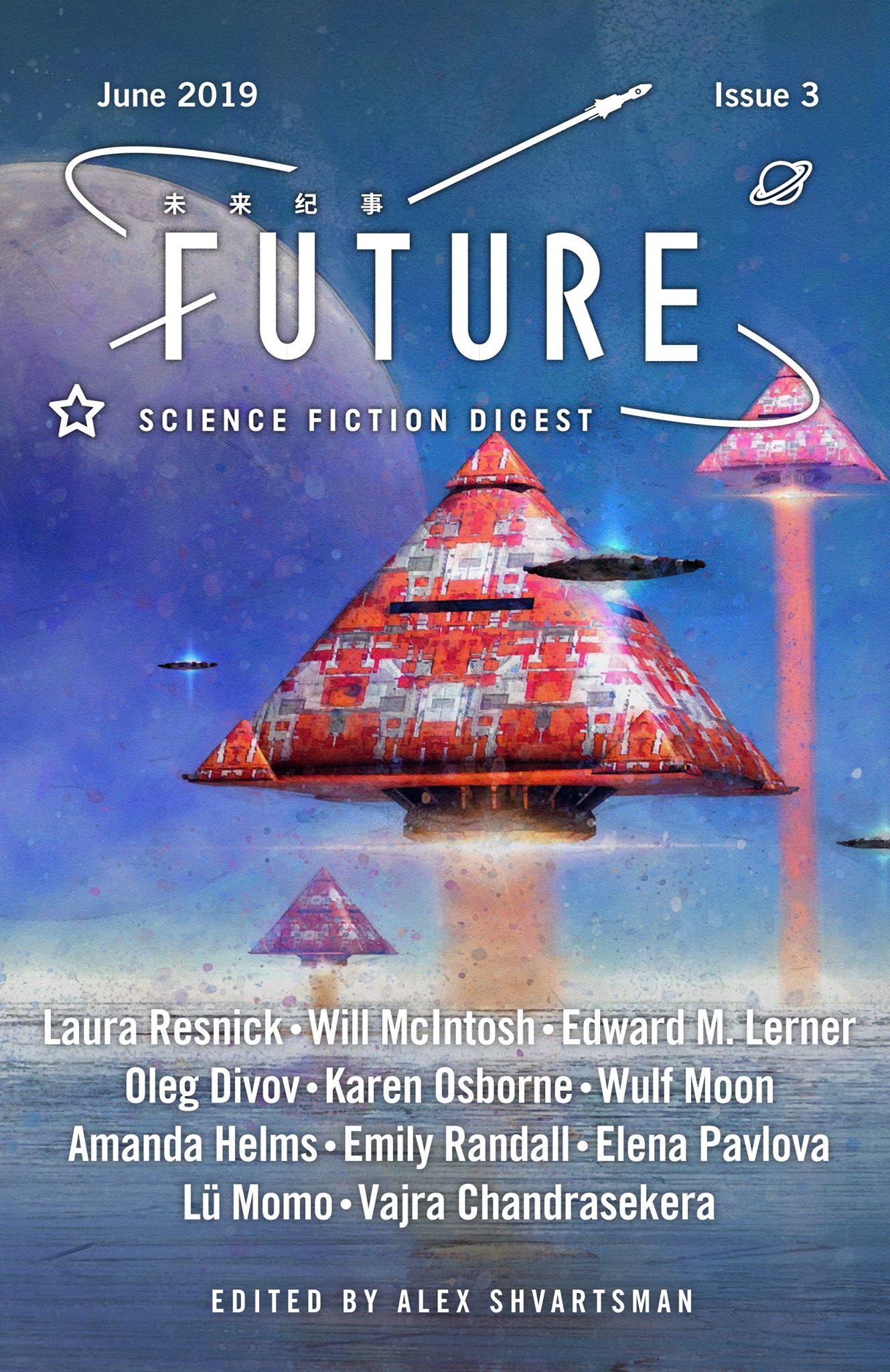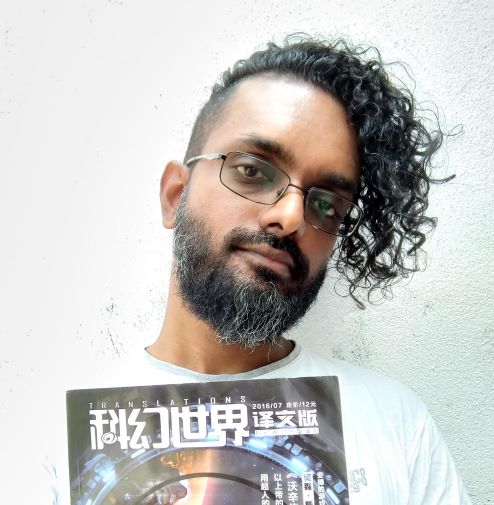Of course they sent a poet. He was quick on his feet, electric, stepping lightly through the portals we opened for him into and across the committee’s carefully Chosen Moments of history. He would only ever stop at each one long enough to read the poem he had composed especially for it.
By necessity they were short and moving poems, because a ChoMo often involved gunfire and arson and a great deal of confusion. If there was too much, the poet might shout his poem into the chaos, or declaim it into the uncaring mob, or even whisper it from shelter. The people of the ChoMo—the temporal natives—were not the audience for his work, but part of the performance.
The poems bore witness; they condemned, they grieved, they memorialized. And, of course, they apologized.
That’s why the committee had selected him from among all the applicants, why he beat out the journalists and the novelists and the essayists and one extremely optimistic sculptor—the poet was good at memory and apology. He had a knack for that perspective of deep history, for the juxtaposition of the Moment to the totality, the vast and tumultuous sweep.
It helped that he was a fast writer, too. His composition was as quick as his feet, where his heart was heavy; the furious poet, all that feeling turned inward and then outward again, a reflection of the deep-set collective guilt of his people, of our people, the committee had sighed in rapturous assessment. This guilty poet, this raging poet, he could retroactively make the apologies that we had never made the first time around. It was, or would be, never too late for the big sorry.
And so the accusing poet, the apologizing poet, the adamant poet went down into the muck of the past to redeem it.
His judgments of his ancestors were uncompromising, and the committee was thrilled to receive the live video of his rapidly declaimed denunciations—he had the snap and verve of a slam poet in full flow, combined with the gradual buildup of a somber political perspective, a grand poetry of witness being constructed as he passed through more and more ChoMos—as he ducked under swinging weapons and stood in front of burning homes to spit out the words that told the truth of what was happening, the words that took responsibility.
The video was crisp and three-dimensional, and watching the feed was, the committee agreed, just like being there next to the angry poet, the righteous poet, the guilty poet.
The recordings were made by a massive entourage of tiny invisible camera-drones that followed him across time, slipping through the portals in his wake, recording his journey in 64k fully holographic high-definition from multiple angles and downstreaming the video to me, his editor in the present day, which was to say, from the poet’s ever-moving perspective, the increasingly distant future.
I chose the streams to be spliced into the public live feed watched by millions, and took care of the drones and the poet alike as they waded deeper and deeper into history.
The drones were easier to watch over. They were sufficiently autonomous to dodge obstacles and find good camera angles, smart enough to learn context from the worlds they passed through, empathetic enough to know which natives to focus on, but not enough of any of those things to develop a sense of self. They were a swarm of disposable perspectives, invisible, adaptable, biodegradable. When they ran out of power, they would fall like soft rain, littering the past. I had plenty more to send after them. For drones that had reached their end-of-life, I imagined that their discarded bodies would be blown through the portals like unseen dust, building up in drifts somewhere in deep time, intangible except in their collective mass, like an odd heaviness upon the landscape over time, a gathering weight with no cause or explanation.
Looking after the poet was harder. Unlike the drones, whose lives and deaths passed without remark and without commentary except in certain highly technical circles, the poet was expected not only to return eventually to the present day after completing his tour, but to return to a hero’s welcome.
A tremendous fandom had accreted around him while he was journeying in time: he would return to instant celebrity status, to critical acclaim, to awards both juried and popular. His fortitude and courage, his great achievement, even the poems themselves as artistic works, it would all be celebrated. There would be profiles, interviews, biopics. The fandom already obsessed over every moment of eye contact he made with any native, of any gender or age, no matter how inappropriate the circumstances, in case it meant that they were fucking in the poet’s off-screen downtime. The fandom shipped the poet not only with his own ancestors but with the ancestors of the othered. The fandom respected no boundaries. I could have told them that the poet was practically celibate compared to their wild imaginings; his downtime was occupied mostly with writing poems, trying to sleep, and avoiding indigestion. But who would have believed me? And to be fair to him, when he did hook up with natives, he seemed to try and pick ones that were not directly involved in the ChoMo, to minimize the conflict of interest. The drones watched all of this, of course, and I did, too, sometimes. But downtime was not for publication. The writing and the rutting poet; the eating and the shitting poet; the sleeping and the screaming poet; the sitting and the staring poet, slack-faced and unseeing: all these streams I piped to null.
The poet didn’t care to know about his fame back home. He spared no thought for a return journey yet. He was consumed only by thoughts of his work.
I knew those things because he told me so. He sent me frequent and voluble updates on the state of his mind and project.
These were the only access I had to his interiority; my job was to focus on his exterior, the beads of sweat on his lip, the singeing of the fine hairs on the back of his neck when he stood too close to a burning house, the way his jaw worked when he heard the screaming. I made his voice boom, his brow fierce—I picked out moments where natives near him seemed to flinch or introspect, so that they seemed struck and crushed by his words, or uplifted if they were victims, though the latter was harder because, after all, the ChoMos were the very moments of their victimization and their affective range was a little constrained.
My work was to make him look larger than life, heroic, a proper vessel for the grand project of atoning and reconciliation that he represented for us all. If he edited himself when he spoke to me, if he concealed a love of fame, if he cared about image, if he trolled his own fandom from anon accounts in his downtime, I had no way of knowing.
His brief was more profound than mine, but also simpler: to witness, memorialize, and apologize at every ChoMo.
It was understood by all of us involved, I think, without necessarily needing to have it said, because even in this project it seemed crass to have to say it quite so bluntly, that he would memorialize the other, who had suffered at our hands, and apologize for our own, who had committed, that is to say, perpetrated, or at least were implicated where nothing was proven—there’s a reason they sent a poet, not a prosecutor.
He was to be the self-criticizing poet, the correctly guilty poet. He was our collective finger of condemnation pointed at a mirror, and then holding that pose, turning our heads a little, shifting hips, finding our good side in the light of truth and reconciliation.
Our endless collective guilt was insatiable, but fortunately there were many ChoMos, a great many, because the poet’s people—who were the committee’s people, and my people, too—had so many sins in our past. The poet’s itinerary would methodically cover every pogrom, every riot, every race murder, every hate crime, every genocide, though of course the committee also put an asterisk next to genocide because you just had to, didn’t you? Seeing as how if those had really been quote unquote genocides there would be nobody left now, would there, except the committee’s people—the poet’s people, which is to say my people—and that was clearly not the case, since minorities still definitely existed in the world in our present day, though not on the committee, and not very well represented in the pool of applicants for the poet’s position or mine. I mean, I think there were some but the committee was very particular about not lowering their standards, so unfortunately that didn’t quite work out. You know how it is. The poet knows how it is. I know how it is. Every morning when I finish my coffee and lean back in my chair for a long day of braiding together videostreams from the past into an improving narrative—one better than the rough mess of ugliness and event that we had called history the first time around, one that gives us an arc of collective redemption—I look over my shoulder expecting some poet from the future to step out of a portal and cut me down to size with some hard-hitting truths while a swarm of invisible cameras records my expression, so I make sure it’s just right, you know, with a period-appropriate degree of contrition.











